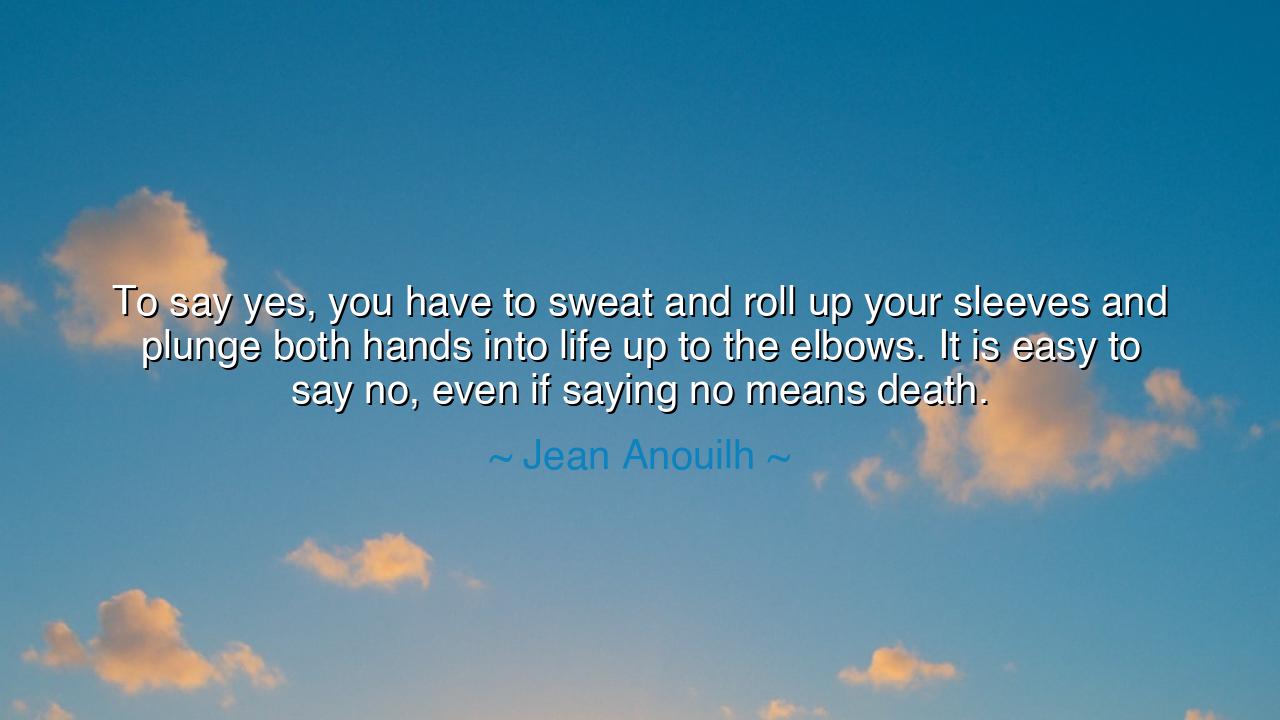
To say yes, you have to sweat and roll up your sleeves and plunge
To say yes, you have to sweat and roll up your sleeves and plunge both hands into life up to the elbows. It is easy to say no, even if saying no means death.






“To say yes, you have to sweat and roll up your sleeves and plunge both hands into life up to the elbows. It is easy to say no, even if saying no means death.” Thus spoke Jean Anouilh, the French playwright whose words burned with the fire of moral struggle and the weight of human choice. In this single declaration, he captures one of the oldest and most difficult truths of existence — that to live fully is to labor, to risk, and to engage, while refusal, though easier, is the slow death of the soul. Anouilh’s wisdom is not soft or sentimental. It is forged in the furnace of experience, for he lived through the moral chaos of war and occupation, and saw that true courage is not the absence of fear, but the willingness to say yes to life — with all its cost and imperfection.
To understand his words, we must recall the time and the spirit in which he wrote. Jean Anouilh lived in France during the Second World War, a time when saying “yes” or “no” was not merely philosophical, but a matter of life and death. His play Antigone, from which this quote arises, retells the ancient Greek tragedy through the lens of modern conscience. In it, Anouilh’s Antigone defies the king’s decree to bury her brother, saying “yes” to love, duty, and truth — though she knows it will lead to her death. But in this “yes,” she lives more fully than those who survive her, for they have surrendered to the convenience of “no.” Thus, Anouilh shows that to “say yes” is to embrace life in its rawest form — to engage with its pain, its contradictions, and its demands — while “no” is the refuge of fear, the rejection of existence itself.
“To say yes,” Anouilh tells us, is to work, to sweat, to struggle. It requires the courage to confront uncertainty and to act even when the outcome is unclear. Those who say yes commit themselves to creation — to building, loving, forgiving, and persisting. They roll up their sleeves and “plunge both hands into life up to the elbows,” unafraid to get dirty, unafraid of disappointment. The farmer who sows his seeds though drought may come, the artist who paints though the world may not understand, the mother who bears her child knowing the world’s pain — all are those who have said “yes.” They have chosen participation over withdrawal, faith over fear, effort over indifference.
Meanwhile, to say no, Anouilh warns, is easy. It is the path of withdrawal, the choice of the coward or the weary soul who would rather avoid the wounds of living. “No” requires no strength, no sweat, no risk. It is the refuge of those who refuse to engage — who say, “It is not my problem,” “It cannot be done,” or “Let the world fall.” Yet in this ease lies destruction. The one who says “no” may preserve their comfort, but they forfeit their humanity. For to live without effort, to refuse the call of duty or love, is to die before one’s body falls. “Even if saying no means death,” Anouilh writes, because a life without engagement is a death in disguise — a quiet, comfortable extinction of the soul.
History is filled with those who have dared to say yes, and by doing so, changed the world. Consider Rosa Parks, who one evening in Montgomery, Alabama, said “yes” to dignity and justice by refusing to surrender her seat. It was not the easy choice — it led to arrest, humiliation, and danger — yet through her courage, a movement was born. She did not wait for perfection or safety; she plunged her hands into life “up to the elbows.” Her act reminds us that every true “yes” comes with cost — and yet it is through these costly affirmations that humanity rises from apathy into greatness.
Anouilh’s words, though born of tragedy, carry the light of endurance. He does not tell us to seek comfort, but to seek meaning. Life, he says, is not a clean or simple thing. To live is to wrestle, to bleed, to build again. Those who wait for ease before they say yes will never live at all. To embrace life is to accept its suffering as part of its beauty — to understand that creation and destruction, joy and sorrow, are bound together. The “yes” he speaks of is not blind optimism, but commitment — the decision to keep loving, to keep fighting, to keep creating, even when the world wounds you for it.
So, my child, remember this truth: to say yes is the act of the brave. It is the gesture of those who refuse to drift through life untouched. When the call of life comes to you — through duty, love, or dream — do not shrink back into the false safety of “no.” Step forward, roll up your sleeves, and meet life head-on. Sweat in the service of what matters. Labor for what is good.
For as Jean Anouilh teaches, the ones who truly live are those who dare to say yes — who plunge their hands into the soil of existence, unafraid of its mess, unafraid of its cost. To say yes is to affirm that life, with all its pain, is still worth the effort. And when your days come to an end, you will not regret your scars, for they will be proof that you truly lived — that you bore witness to the great and terrible beauty of being alive.






AAdministratorAdministrator
Welcome, honored guests. Please leave a comment, we will respond soon